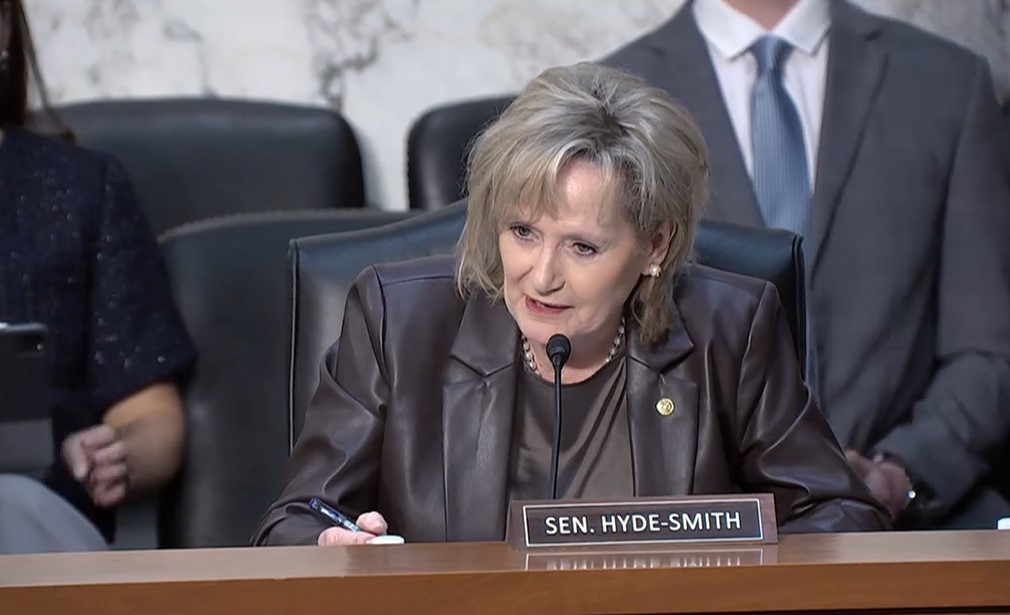HYDE-SMITH, WITNESSES SEE STARK FUTURE FOR PRODUCERS WITHOUT NEW FARM BILL
Ag Committee Hears from Senatobia Sweet Potato Farmer on Need for Stronger Specialty Crop Safety Net, H-2A Visa Reforms & Death Tax Repeal

VIDEO: Senator Hyde-Smith Questions Mississippi Sweet Potato Farmer on Risks Without a New Farm Bill.
VIDEO: Senator Hyde-Smith, Witness Discuss How the Death Tax Harms the Agriculture Community.
PHOTO: Senator Hyde-Smith Visits with Anna Rhinewalt of Senatobia’s Sandy Ridge Farms.
WASHINGTON, D.C. – U.S. Senator Cindy Hyde-Smith (R-Miss.) today prompted stark warnings of farm failures from specialty crop producers, including a Mississippi sweet potato farmer, if Congress falters in its long overdue writing of a new Farm Bill with a stronger farm safety net.
Hyde-Smith participated in a Senate Agriculture Committee hearing to receive testimony on the challenges and outlook for specialty crop growers, as well as livestock, poultry, and dairy producers. The hearing, Perspectives from the Field: Farmer and Rancher Views on the Agricultural Economy, Part 2, featured testimony from Anna Rhinewalt of Sandy Ridge Farms, Inc. in Senatobia.
“Our witnesses, who came from across the country, all expressed the same stark message, namely that having to rely on an outdated Farm Bill is putting their livelihoods and American agriculture at risk,” Hyde-Smith said. “I particularly appreciate Anna Rhinewalt telling us very clearly that so many farmers won’t survive without Congress acting to address the farm safety net, labor supply, high input costs, and regulatory burdens.”
Asked by Hyde-Smith to envision where her family’s farming operation would be in five years without a new Farm Bill, Rhinewalt testified that most specialty crop producers would not be able to bear the rising costs of production.
“If we don’t make changes, I don’t think it will take five years for us to get the answer. It will be far less. Certainly, if we stay on the trajectory that we are currently on, it will take far less to put a vast majority of specialty crop producers out of business,” said Rhinewalt, who serves on the Mississippi Farm Bureau Federation and Mississippi Sweet Potato Council.
Rhinewalt also told Hyde-Smith that the safety net in the 2018 farm bill for specialty crop producers is insufficient and “not triggering as quickly as it should to really provide the relief we need.”
Citing federally-mandated labor rates and excessive bureaucratic red tape, Rhinewalt and other producers also advocated for the committee to work with the other committees of jurisdiction to reform the H-2A Visa Program, which the U.S. Department of Labor administers. The visa program is particularly important for specialty crop producers, who rely on it for temporary or seasonal migrant labor.
Hyde-Smith also sought witness testimony on the effect of the federal estate tax, or death tax, on the future of farming and ranching. Hyde-Smith recently cosponsored renewed legislation to permanently repeal the federal death tax.
“The death tax is a massive burden on so many cattle producers and other farm operations, forcing these families to sell off livestock and property after the death of a family member simply to pay the IRS,” Hyde-Smith said. “While tax legislation doesn’t fall under this committee’s jurisdiction, the farm community needs to become more vocal about the death tax. So many people don’t know how many acres are taken out of production while we’re trying to feed this country because of this tax.”
###
